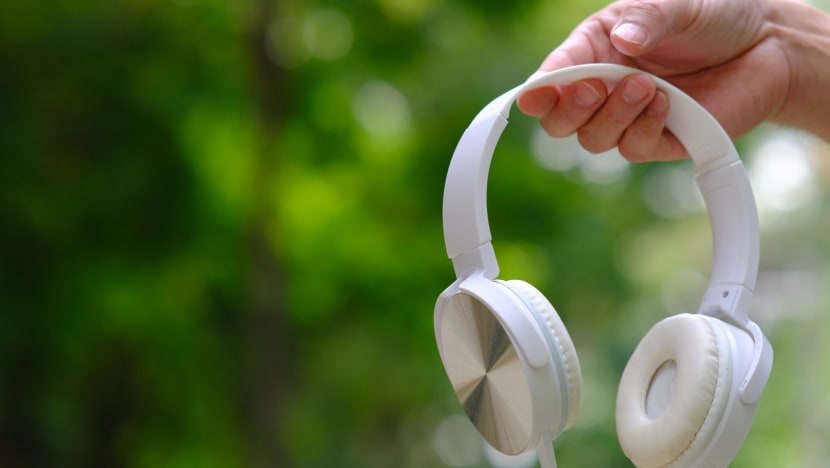Commentary: Noisy people in public parks and spaces – spare a thought for others
Tensions arising when more people are in public spaces can be easily managed with a few kind gestures and nudges, says SUSS’ Omer Ali Saifudeen.

Woman sitting in a park, getting some time for quiet self-reflection. (Photo: iStock)
SINGAPORE: Picture this scenario - after a hard day’s work, you head to your favourite park for a run, with the hope of some peace and to take in nature.
After a good workout, you sit down and gaze at the serene waters of the pond, grateful for some moments of reflection.
But not a minute passes before you hear the loud sounds of hip hop music blaring from a Bluetooth speaker, invading your space.
It is not deafening, but it destroys the tranquility of the moment, not just for you but for everyone around you whom you can see staring at the culprit with dagger eyes.
Gone are the sweet sounds of nature you were just enjoying – the joyful call of the myna perched on a nearby tree and even the crow you're sure was the same one lurking at the neighbourhood coffeeshop the last time you were there.
You begin to ponder your options, including what laws the miscreant might have broken that you can take them to task on to get them to cease and desist. But unfortunately, since the music is not excessively loud, it doesn’t seem to qualify for penalties under the Miscellaneous Offences (Public Order and Nuisance) Act.
You are tempted to approach the individual to ask him to switch off his aggravating speaker, only to realise it is precisely that – a public space, and the individual with his thundering tunes also has a right to be there.

PUBLIC SPACES ARE GETTING CROWDED
People in Singapore are increasingly flocking to beaches, parks and other public spaces after almost two years of travel being curtailed.
Space has always been a premium in Singapore but the naturesque and calm options one has to escape to have become all the more sought after for people cooped up in tiny apartments.
We are spending picnics and family outings in green spaces like Fort Canning Park and Botanic Gardens. We are rediscovering hidden gems in little known outlying areas surrounded by nature, trekking along the park connectors in Singapore and exploring Clementi forest.
Everybody has the same idea so we therefore find ourselves in the same crowded places. Naturally, there are bound to be tensions when unspoken social norms of behaviour are violated.
Sociologist Erving Goffman in his book on Behaviours in Public Spaces wrote about how the rules of conduct in public spaces tell us a lot about the society we live in and how it is organised.
He explains whether an act is considered improper or tolerated is based on the collective judgement of a specific social group.
In the hypothetical example described above, if it is an agreed-upon social norm that one should not play music aloud in public spaces like parks where others are there to enjoy the quiet, then anyone who goes against this is bound to be informally sanctioned by angry stares or someone telling them to wear headphones.
And yet a person picnicking by the beach and wants to play some music surely also has a right that public space. Perhaps this is why no one else confronted the fellow with the loud speakers despite being clearly miffed.
WHEN INCIDENTS BECOME ALTERCATIONS
So then how? What do you do? Are you in the wrong for wanting some peace?
US sociologist John Hagen in his book, Crime And Disrepute, describes these social irritations as social diversions – relatively harmless, minor acts of deviance that might invoke at worst, mild societal reactions such as scorn.
These boundaries are being negotiated, sometimes quite violently. We have seen how with tensions rising from hardships brought on by the pandemic are challenging societal yardsticks on acceptable behaviour.
All it takes is a minor irritation to escalate an incident into a serious altercation that taps on seething frustrations and inherent biases.
Sadly, some incidents begin with the mundane but end with a note of aggression, violence and even the law getting involved. Take for example, fights on public transport that started with a minor incident or quarrel over MRT seats, and a recent court case involving a man who started a fight after a staring incident in Bedok.
Is this what we might be seeing more of? Will public spaces become the stage for more microaggressions to be played out?
Perhaps such incidents provide a barometer of social tensions that reopens discussions on being a gracious society, giving and taking, tolerance, respect and empathy so that new rules can be established.
At its core, graciousness is simply about going beyond our immediate needs and sparing a thought for the other individual. It could mean considering also whether blaring loud music is a way someone playing it finds release.
What is unclear is what remedial action should be taken and by whom in this case
Who are "sovereign citizens" and why are they breaking COVID-19 rules? Listen to NUS and SMU professors unpack this phenomenon on CNA's Heart of the Matter:
MANAGING SOCIAL IRRITATIONS
Perhaps we can leave aside involving the authorities. Renowned American urban sociologist Robert Ezra Park once wrote how our actions are “checked, inhibited or modified by the gesture and actions of his fellows”. If we go by this, not every social diversion and irritation needs a campaign or law to manage.
The overarching solution to most of our everyday irritations lies in both parties being willing to notice, graciously listen to someone’s concerns and empathise with what is troubling them.
Getting people to change their everyday public behaviour is no easy feat. Instead of persuading people, one of the strategies advocated by University of Pennsylvania Professor Jonah Berger who wrote the book, The Catalyst: How to Change Anyone's Mind, has been to get people to persuade themselves.
He says we should pose questions to individuals less aware of the impact of their actions.
Returning to our example, we could ask the person with the Bluetooth speaker what he would say to someone exhausted and emotionally worn out from life events and needs a quiet moment in a public space but finding that in the one place of relative calm, someone was blasting away music.
Such an approach moves away from public pronouncements about what one should or should not do, and gets people to put themselves in another’s shoes.
The hope is to prod modest changes to people’s behaviour they can easily agree with and reduce the natural psychological reaction to say no that creeps in when someone is told to do something that imposes the will of others on them or curbs their current course of action.
Returning to our example at the beginning of this commentary, perhaps you smile and decide to move away to somewhere quieter as the park is big enough for everyone.
Maybe before you go, you put on a big warm smile and wave to the man with the Bluetooth speaker, wishing him an enjoyable evening and mentioning in passing that you are going somewhere quieter as you had a very difficult day.
Maybe the individual won’t care less and carry on playing the music.
But just maybe he identifies with people having a rough day and decides to put on headphones instead.
Dr Omer Ali Saifudeen is a sociologist and Senior Lecturer, Public Safety and Security Programme, at the School of Humanities and Behavioural Sciences, Singapore University of Social Sciences.




















